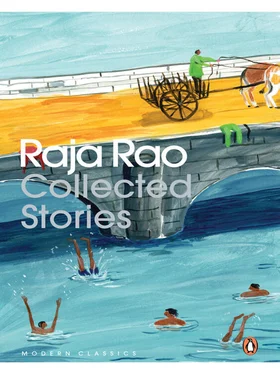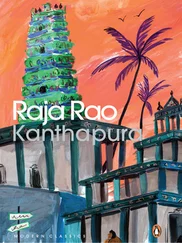Raja Rao - Collected Stories
Здесь есть возможность читать онлайн «Raja Rao - Collected Stories» весь текст электронной книги совершенно бесплатно (целиком полную версию без сокращений). В некоторых случаях можно слушать аудио, скачать через торрент в формате fb2 и присутствует краткое содержание. Год выпуска: 2014, Издательство: Penguin, Жанр: Классическая проза, на английском языке. Описание произведения, (предисловие) а так же отзывы посетителей доступны на портале библиотеки ЛибКат.
- Название:Collected Stories
- Автор:
- Издательство:Penguin
- Жанр:
- Год:2014
- ISBN:нет данных
- Рейтинг книги:5 / 5. Голосов: 1
-
Избранное:Добавить в избранное
- Отзывы:
-
Ваша оценка:
- 100
- 1
- 2
- 3
- 4
- 5
Collected Stories: краткое содержание, описание и аннотация
Предлагаем к чтению аннотацию, описание, краткое содержание или предисловие (зависит от того, что написал сам автор книги «Collected Stories»). Если вы не нашли необходимую информацию о книге — напишите в комментариях, мы постараемся отыскать её.
Collected Stories — читать онлайн бесплатно полную книгу (весь текст) целиком
Ниже представлен текст книги, разбитый по страницам. Система сохранения места последней прочитанной страницы, позволяет с удобством читать онлайн бесплатно книгу «Collected Stories», без необходимости каждый раз заново искать на чём Вы остановились. Поставьте закладку, и сможете в любой момент перейти на страницу, на которой закончили чтение.
Интервал:
Закладка:
Muthradas and Lakshmi-ben were married for just fifty years. Nobody in the family now remained, uncles and aunts they died one after the other with this illness or that or of old age, which comes whether you want it or not — while the Kathiawar autumn festival’s demands became less with Ahmedabad millware, and Kanakmal’s family had only the old couple left, their account books, and many, many pillars. And just three camels. Muthradas adopted his second cousin’s son Moti Chand (a boy of seven), and before he could finish even his high school he showed up his ancestry. Though his mother he was connected with the Raghav Das Nathumals of Palitana. Now you understand!
He made unnecessary demands, and asked for monies and monies again, and was found, one morning, in the gutter by a prostitute’s house. They married him off but that brought no help. He beat his wife and eloped with a Brahmin pilgrim to Delhi. One wept at home, and one asked astrologers. ‘In three years Rahu’s position in the third house will be free, and he will return — do not fear.’ Indeed, just as the astrologer had predicted, after three years Moti appeared, neat and simple, as if much had happened within these intervening years. He stayed a model husband (life sometimes plays those awful tricks of Rahu or Ketu, it does not matter) and then he too died childless leaving behind his widow. Vrindavan was all sorrow and tears for Muthradas and Lakshmi-ben. But one day, a few months later, Lakshmi-ben herself was killed by a bus as she was crossing the street, after feeding the cows at the Goshala opposite (Oh these New Delhi bus drivers). Muthradas had no heart even for Vrindavan any more — he left his daughterin-law and her adopted son (he seemed a bright child and a good grandson who’d offer the annual funeral feast to his departed ancestors) and Muthradas with his cloth, bundle, his Ramayana, and his small cash, came to Benares and settled there forever.
His room on the third floor of Ananda Mahal building had always light at night — he read philosophical books. In the afternoons, however, he went to hear the Ramayana — Pandit Uday Shankerji of Kalyan gave ecstatic discourses on Tulasi Ramayana and hardly had he wiped his tears, then he came back home, ate his dry rice and pickle, and opened his books of philosophy. Vedanta is a heady subject and if you’re not aware, you will fall into unsuspected pits. He searched for a Guru, did Muthradas, and found one by the Ambasamudram hospice. The Guru was a man from the south but spoke some Hindi (he could speak English too, but Muthradas knew no English). The Guru’s sacred name was Sankarananda. Muthradas was given his initiation after some three years of spiritual practices. Many problems in Vedanta are connected with dream and sleep. They became a little clearer now. Muthradas had always believed you slept when you slept and you dreamt when you dreamt. What meaning could they have? But in Vedanta there’s so much talk of the walking state, the dream, dreamer and so on. And the nature of deep sleep is beyond comprehension. ‘Seeing, hearing, thinking and knowing are always experienced by people in dream, moreover, as they are essentially the Self. It is directly known.’ Sitting by the lamplight (electricity, though available, seemed a luxury), he read his Sri Sankara. The hurricane lantern helped you at night in your room, and at dawn it followed you to the ghats for your lavations. Shambho Shankara. Muthradas opened his Upadesha Sahasriyam and read again. ‘There is no vision in me as I am without the organ of seeing. How can there be hearing for me who have no auditive organ? Devoid of the organ of speech I have no action of speaking in me. How can there be thinking in me who have no mind?’
He waits for death, does Muthradas, as one waits for a car, the car that will take you to the Railway Station. ‘Grandfather, don’t you worry, you’ll catch the Agra Express. It arrives only at eleven-nineteen. It’s only nine-thirty now.’ But then there’s all the town to cross — sometimes you’re held up at the market square, or by the Boli Chawl Mosque, were it a Friday morning. A cur might run under your wheel or the engine may suddenly go phut. What a procession life is till you get to the station. The fact is, the Agra Express is always on time (even after Indian Independence). If death does not know time, pray who does? Time, however, is so evasive with man,
Muthradas gets three letters a year from his adopted grandson. The grandson writes for his father’s funeral-anniversary and for his adopted grandmother’s obsequies (‘the Brahmins were well pleased, and so must the manes have been, for such the auspicious caw-cawings of the crows after the feast’). He writes again on the eighth day of Dusshera, and finally on the first day of Divali, before he opens his new account book. The Kathiawar market has since been made up partially with touristic demands, today you have pilgrims and tourists. There are no camels now, and so no Mohammed. It’s all a past story. But when the trains rumble on the Dufferin Bridge you wonder if you should not put on your clothes and go down for the car. One should never make the car wait. For once you go you never come back. It’s just a question of courtesy.
Before the third letter of the year, this year (that is 1963) the car was at the door, and the four-shoulder Brahmins took his last procession to the ghats. Muthradas’ skull splits in no time — he was a virtuous man, of this there was no doubt. He had not yet discovered the true similarity between the waking state and the dream state, but there are still so many life cycles to come. Man goes where he has to go but one day he will arrive where there’s no going or returning. A car can always take you to the railway station. But you don’t need (or do you?) a car to go to yourself? No.
V
‘Bhedia! Bhedia!’ you say, as he grins, ‘Bhedia, how did you ever come here?’ and he smiles with his broad hands, he makes signs with his nose (lifting it back and forth, and then hiding his face between the knees), he answers, does Bhedia, ‘The cucumber was bad so it became sad. The cucumber was bad so it became sad.’ ‘Now what does that mean?’ you may ask Bhedia, and he replies as if it were clear as his eyes (and he had beautiful dark eyes, with rounded eyebrows, long eyelashes and a limpid wheat-coloured skin under). ‘The moon went up to the sky and stood, and the hill suddenly became a lake so that Ramji and Krishnaji could besport themselves in Vrindavan, you understand!’ And Bhedia takes a long gasp of breath, with his hookah. ‘So Benares became a hotel. 1You understand— you buy and you sell. You sell puri and halva, and cowries for gold, and all the monkeys make marriages. All the marriages in this city are made by monkeys,’ affirms Bhedia with a look of friendly contempt. ‘First Arjun came to the forest and got caught in the house of wax and that was in Benares. Now, Rama lost his sheep, and the donkeys went astray. You know donkeys like those who graze on the Ganges banks. And I came here, the noble son of Kunti, and that was long ago. Long after the Mahabharata was,’ 2says Bhedia and laughs into his things. ‘Life is so funny, Maharaj. Before the war I served a Prince. He was so kind, and he had four black horses. I groomed them and fed them and harnessed them, and crying, “Hé, Hé, the prince of Chandrapur!” I took him about town in his large, spacious landau, made in London you understand, yes, in London, and drove him to the railway station, to the mills, to the club, to his mistresses. Oh, to be sure he had a concubine and a good one at that. She always had jellebies and sent them to me through the backyard — she knew I loved sweets. I gave them all to the horses. My horses were like Nala’s, they could span the skies in an hour, and be in Indra’s kingdom in a day. In my own time I have seen many a swayamvara ceremony. I was at Bhoja Raja’s swayamvara and at that of Vikramaditya’s daughters. I was wherever there was duty to perform,’ and here suddenly Bhedia burst into tears, and the pilgrims who stood by the Ganges banks, prasad in their hands and hair, would look at Bhedia, his woebegone tatters, his idiotic smile, his long nails and his unwashed presence, and would turn away and look at the Ganges to feel pure and safe.
Читать дальшеИнтервал:
Закладка:
Похожие книги на «Collected Stories»
Представляем Вашему вниманию похожие книги на «Collected Stories» списком для выбора. Мы отобрали схожую по названию и смыслу литературу в надежде предоставить читателям больше вариантов отыскать новые, интересные, ещё непрочитанные произведения.
Обсуждение, отзывы о книге «Collected Stories» и просто собственные мнения читателей. Оставьте ваши комментарии, напишите, что Вы думаете о произведении, его смысле или главных героях. Укажите что конкретно понравилось, а что нет, и почему Вы так считаете.












